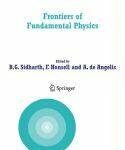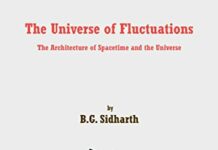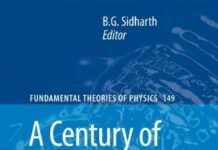
Ebook Info
- Published: 2008
- Number of pages: 304 pages
- Format: PDF
- File Size: 4.41 MB
- Authors: B G Sidharth
Description
Particle Physics and High Energy Physics have stagnated since the early 1970s. Now, the underlying principle of reductionism — so sacred to twentieth-century physics — is itself being questioned. This book examines these tumultuous developments that are leading to a paradigm shift and a new horizon for Physics.Presenting the new paradigm in fuzzy spacetime, this book is based on some 100 papers published in peer-reviewed journals including Foundations of Physics, Nuovo Cimento and The International Journal of Modern Physics (A&E), as well as two recently published books, The Chaotic Universe (Nova Science, New York) and The Universe of Fluctuations (Springer). The work had predicted correctly in advance epoch-turning observations, for example, that the Universe is accelerating with a small cosmological constant driven by dark energy when the prevalent line of thinking was the exact opposite. Similarly, the prediction of a minimum thermodynamic residual energy in the Universe has also been realized more recently. Further to a unified description of gravitation and electromagnetism via fluctuations, several other features are presented in complete agreement with experiments, in sharp contrast to the present ideas which are neither verifiable nor disprovable.
User’s Reviews
Reviews from Amazon users which were colected at the time this book was published on the website:
⭐The Thermodynamic Universe: Exploring the Limits of Physics is about fuzzy spacetime. It arrved on time in good condition. Requires math and physic backround to get into it.
⭐The author has compiled a review of his own contributions to physics and cosmology. These include a number of speculative thoughts, including his simple formula for the mass of a wide range of the elementary particles known as Hadrons (i.e. Mesons and Baryons). This formula for mass=m(n+1/2)137 MeV, where m and n are integers (p.146), is successfully compared with the experimental values of particle masses on pp.148-156. Apparently this formula has yet to have a large impact on the physics community, as the journal article in which it was introduced has only received 2 citations. Other speculative theories addressed in this volume include the Feynman-Wheeler treatment of advanced and retarded fields (pp.6-7).It is not clear who is the intended audience for this book–and unlike most books there is no mention of such an audience in the preface. At the very least the reader would need the equivalent of a B.S. in physics to benefit from this book at all. Graduate level courses in quantum mechanics would be necessary to understand many of the topics. An understanding of quantum field theory would also help the reader in appreciate many of the author’s observations.This almost 300-page book is filled with about 1000 equations (i.e. several per page) and 455 references–but there are no figures–not one–not even a Feynman diagram! It is almost like a stream of consciousness account of the author’s thoughts–which are therefore difficult for the reader to follow. Nevertheless, this book is appealing to some degree, from the discussion of dark matter (p.28; a topic to which the author seems to have made an important contribution) to an explanation of something as conventional as positively-charged carriers (i.e. holes) in a semiconductor (p.35). There is an interesting discussion comparing the thoughts of the ancient Greeks on atomic theory and cosmology with that of Vedic India (p.1). I was also amused by the author’s observation that the range of the Yukawa potential for the photon (given the extremely small estimated mass of the photon) is approximately the radius of the universe (p.140).
⭐Je l’ai reçu en temps.
Keywords
Free Download Thermodynamic Universe, The: Exploring the Limits of Physics 1st Edition in PDF format
Thermodynamic Universe, The: Exploring the Limits of Physics 1st Edition PDF Free Download
Download Thermodynamic Universe, The: Exploring the Limits of Physics 1st Edition 2008 PDF Free
Thermodynamic Universe, The: Exploring the Limits of Physics 1st Edition 2008 PDF Free Download
Download Thermodynamic Universe, The: Exploring the Limits of Physics 1st Edition PDF
Free Download Ebook Thermodynamic Universe, The: Exploring the Limits of Physics 1st Edition



